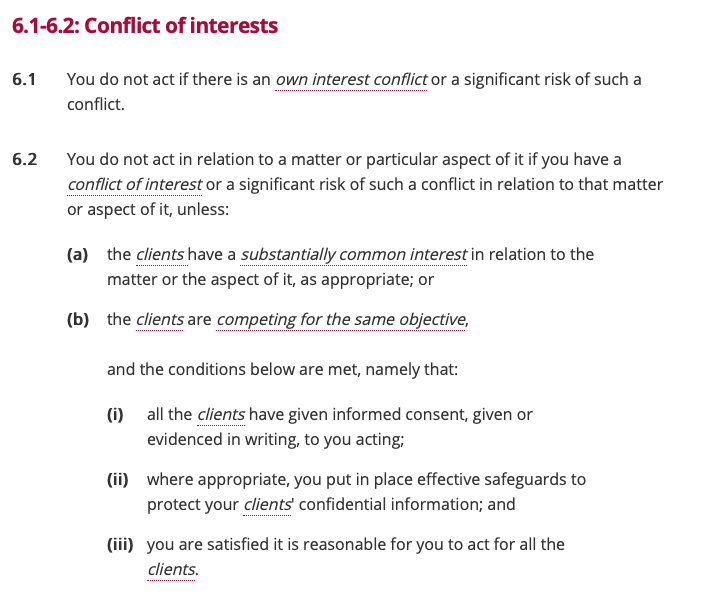Dealing with conflicts of interest is a day-to-day part of legal practice. It is (or should be) at the forefront of every lawyer’s mind when they take on a new client and beyond.
Sometimes, it’s worth refreshing our understanding of even basic key concepts.
What is a ‘conflict of interest’?
A ‘conflict of interest’ is essentially a situation where the aims or objectives of two different parties are not compatible.
A lawyer is conflicted if they cannot act in the client’s best interest due to competing interests. Being able to act ‘in the best interests of each client’ is a core pillar of professional conduct.
Two types of conflict situations arise in legal practice: ‘own interest’ and ‘client’ conflicts.
Own interest conflicts
Own interest conflicts are between you and current clients. If your (or your firm’s) interests are in conflict with your client’s interests, or there is a significant risk of an own interest conflict arising, you cannot act (rule 6.1 of the Code of Conduct).
This might be relevant when:
- you sell property or another asset to a client
- you have to negotiate with your own client
- you discover an act or omission which could justify the client making a claim against you
- you are involved in a personal relationship with the client
Client conflicts
Client conflicts occur when the interests of two or more current clients are not aligned, or diverge during the course of a retainer. If this situation arises, or there is a significant risk of the conflict, you must not act for both or all of the clients (rule 6.2 of the Code of Conduct).
The classic example is co-defendants whose stories change or start accusing each other. The most common client conflicts in practice tend to arise in property, commercial, private client and litigation departments.
There are some limited exceptions to the client conflict rule: the ‘substantially common interest‘ and ‘competing for the same objective‘ exceptions. The former is pretty broad and will depend on the facts of the case. The latter is a very niche situation, which is intended to capture commercial tenders and competitive bids.

These exceptions are poorly drafted. It would appear that the conditions (informed consent, safeguarding confidential information, reasonable to act) only relate to the ‘competing for the same objective’ exemption.
But the guidance clearly states that “you can only rely on either exception if a specific set of conditions are all met“.
As a solicitor, you will find that some conflicts will be apparent from the start. Others may not be so obvious, but you should be mindful to the possibility of them arising (especially if instructions change at a later date) and continue to monitor and assess a case as it progresses.
Commercial conflicts
Commercial conflicts are those difficult situations where acting for one client may damage your relationship with another. This is not necessarily a conflict of interest or ethical consideration per se, even if the clients are competitors.
It is often just a commercial decision you must make. Is it worth forgoing work from client A for the longer term relationship with client B?
However, do be careful of the competing duties of confidentiality and disclosure.
Confidentiality vs disclosure conflicts
We all know that solicitors have both a duty to keep client information confidential and a duty to tell clients everything that is relevant to their matter (rule 6.3 to 6.5 of the Code of Conduct).
Sometimes these separate duties come into conflict. Let’s say you decide to act for competitor businesses, perhaps against your better judgement. If you become aware of facts in your retainer with client A that would be relevant to client B’s matter, you would be in a bit of a pickle. You would be under an obligation to tell client B what you know, but not able to breach client A’s confidentiality.
In this situation you would probably have to stop acting for client B. Confidentiality trumps disclosure. How you explain this without letting the cat out of the bag is another matter.
Top tips to deal with conflicts
- When deciding whether to act, go back to first principals. Can you act in all the clients’ best interests? Is it ethical to do so? Are there wider risks (e.g. commercial, reputation) in continuing to act? Is it worth the additional fee income?
- Have a clear, easy to use system to flag up conflicts. Use your case management or accounts system where possible. Check at the outset of the retainer, but make sure everyone understands that conflict checking is not a ‘one time thing’. It is an ongoing duty.
- Give regular training to your staff on the concept of conflicts of interests (see our upcoming webinar, for instance) as well as your internal systems and controls.
- File reviews should check whether proper conflict searches have been done.
- Keep and maintain a register of interests. Make everyone declare interests they have in other organisations, and ensure this is part of the conflict checking process.
- If the COLP reviews a matter because of a possible conflict, note the file with your decision and any guidance given to the fee earner (keeping an audit trail and record of your thinking)
- Watch out for confidentiality v disclosure conflicts!
- Have a policy on when it is appropriate to act for personal contacts.
- When relying on the exemptions to client conflicts, make sure you clearly have the clients’ informed consent, you have put in place safeguards and have considered reasonableness. Spell it out on the file.
- Things can change! You will need to keep any possible conflict under constant review during a case, particularly so where you have decided one of the exceptions apply.
- Keep a conflict register, this will help you to monitor what sort of conflicts arise and can inform policies and training.
- Try to avoid ‘groupthink’ in conflict committees. The people sitting on those committees may have an incentive to persuade each other that a conflict situation is not a problem. Low and behold, that is the conclusion they will reach. Try to add objectivity or an influential dissenting voice to the committee.



![Dealing with conflicts of interest [12 tips] Dealing with conflicts of interest [12 tips]](https://www.jonathonbray.com/wp-content/uploads/bfi_thumb/dummy-transparent-obadi0wivgww4ihdae9xs8qbf69cenia3a5vcdxo0e.png)




